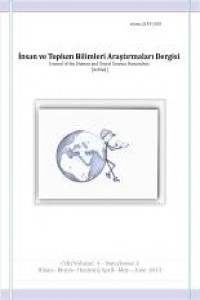Abstract
Every living creature needs water to continue living. Water as a vital need for human being has been classified as a public good till 1992. In 1992 at the “Water and Sustainable Development” conference which was held at Dublin Ireland it was suggested that water needs to be treated as an economic good. In fact, water is a scarce resource only that the 2% of the whole water resources are usable for humanitarian needs. Countries around the world having different kinds of usable water recourses have increased the strategic importance of water. On the other hand the transportation of water is hard and also needs high costs. In 1993 Professor J. A. Allan has claimed that water is used in the production of most goods and this water which is used during the production process can be traded virtually by selling or buying of the final product. This idea has been used as a foreign trade policy by the countries which have scarce water resources. With the current data’s and researches the benefits and loss of virtual water trade is analyzed.
References
- Allan, J. A. (1997). 'Virtual water': a long term solution for water short Middle Eastern economies? (pp. 24-29). School of Oriental and African Studies. University of London.
- Allan, J. A. (2001a). The Middle East Water Question: Hydropolitics and the Global Economy. London: United Kingdom. I B Tauris.
- Allan, J. A. (2005). Virtual water: A strategic resource global solutions to regional deficits. Ground water. Vol.(36). P.545-546.
- Aktan, Coşkun C. (2001). Kamu Ekonomisi ve Kamu maliyesi. İzmir: Anadolu Matbaacılık.
- Aytemiz L., Kodaman T. (2006). Sınır Aşan Sular Kullanımı Ve Türkiye- Suriye İlişkileri. Tmmob Su Politikaları Kongresi. s.527-537.
- Bozzo, S. (Yönetmen). (2008). Blue Gold: World Water Wars. USA: Purple Turtle Films.
- Chapagain, A. K., & Hoekstra, A. Y. (2004). Virtual Water Trade Volume 1: Main Report.
- Hoekstra, A. Y. (Ed.). (2003, February). Virtual water trade: Proceedings of the international expert meeting on virtual water trade. IHE Delft Value of Water Research Report Series. No. 12. S.43.
- Horlemann L., Neubert S. (2007). Virtual Water Trade: A realistic concept for resolving the water crisis?. German Develpment Institute. ISSN 1860-0468. s.48-51. Almanya.
- Pearce, F. (2006). When the Rivers Run Dry: Water, the Defining Crisis of the Twenty-first Century. Beacon Press.
- WWAP (United Nations World Water Assessment Programme). (2015). The United Nations World Water Development Report 2015: Water for a Sustainable World. Paris, UNESCO.
- World Water Council (2004). E-Conference Synthesis: Virtual Water Trade – Conscious Choices, March.
- WorldPop to 2300 (United Nations Department of Economic and Social Affairs). (2004). World Population to 2300. New York, UN.
- Aytemiz, L. (2001). The Optimal Joint Provision Of Water For Irigation And Hydropower In The Euphrates River: The Case Of Conflict Beetween Turkey And Syria. (yayımlanmamış doktora tezi) Oklahoma State University. Doktora Tezi, s. 124.
Abstract
Bütün canlılar yaşamlarının devam ettirmek için suya ihtiyaç duyar. İnsanoğlunun da hayati gereksinimi olan su 1992 yılına kadar kamusal mal olarak ele alınmıştır. Fakat 1992 yılında Dublin’de düzenlenen “Su ve Sürdürülebilir Kalkınma” konferansının sonuç bildirgesinde suyun “Ekonomik Mal” olarak ele alınması gerektiği öne sürülmüştür. Gerçekten de “Su” kıt bir kaynaktır ve kullanılabilir su kaynaklarının oranı su rezervinin yüzde 2’si kadardır. Ülkelerin farklı miktarda kullanılabilir su kaynağına sahip olmaları suyun stratejik önemini de arttırmıştır. Suyun bir yerden başka bir yere taşınması ise hem zor hem yüksek maliyetli bir iştir. Profesör J. A. Allan 1993 yılında suyun birçok ürünün imalatı için girdi olarak kullanıldığı ve bu suyun “Sanal Su” olarak ticaret konusu haline gelebileceğini iddia etmiştir. Bu fikir su fakiri ülkelerin su kaynaklarını etkin kullanabilmeleri için bir dış ticaret politikası olarak uygulanmaya konulmuştur. Eldeki veriler ve çalışmalar ışığında sanal su ticaretinin faydaları ve zararları analiz edilmiştir.
References
- Allan, J. A. (1997). 'Virtual water': a long term solution for water short Middle Eastern economies? (pp. 24-29). School of Oriental and African Studies. University of London.
- Allan, J. A. (2001a). The Middle East Water Question: Hydropolitics and the Global Economy. London: United Kingdom. I B Tauris.
- Allan, J. A. (2005). Virtual water: A strategic resource global solutions to regional deficits. Ground water. Vol.(36). P.545-546.
- Aktan, Coşkun C. (2001). Kamu Ekonomisi ve Kamu maliyesi. İzmir: Anadolu Matbaacılık.
- Aytemiz L., Kodaman T. (2006). Sınır Aşan Sular Kullanımı Ve Türkiye- Suriye İlişkileri. Tmmob Su Politikaları Kongresi. s.527-537.
- Bozzo, S. (Yönetmen). (2008). Blue Gold: World Water Wars. USA: Purple Turtle Films.
- Chapagain, A. K., & Hoekstra, A. Y. (2004). Virtual Water Trade Volume 1: Main Report.
- Hoekstra, A. Y. (Ed.). (2003, February). Virtual water trade: Proceedings of the international expert meeting on virtual water trade. IHE Delft Value of Water Research Report Series. No. 12. S.43.
- Horlemann L., Neubert S. (2007). Virtual Water Trade: A realistic concept for resolving the water crisis?. German Develpment Institute. ISSN 1860-0468. s.48-51. Almanya.
- Pearce, F. (2006). When the Rivers Run Dry: Water, the Defining Crisis of the Twenty-first Century. Beacon Press.
- WWAP (United Nations World Water Assessment Programme). (2015). The United Nations World Water Development Report 2015: Water for a Sustainable World. Paris, UNESCO.
- World Water Council (2004). E-Conference Synthesis: Virtual Water Trade – Conscious Choices, March.
- WorldPop to 2300 (United Nations Department of Economic and Social Affairs). (2004). World Population to 2300. New York, UN.
- Aytemiz, L. (2001). The Optimal Joint Provision Of Water For Irigation And Hydropower In The Euphrates River: The Case Of Conflict Beetween Turkey And Syria. (yayımlanmamış doktora tezi) Oklahoma State University. Doktora Tezi, s. 124.
Details
| Primary Language | Turkish |
|---|---|
| Journal Section | Articles |
| Authors | |
| Publication Date | April 22, 2015 |
| Published in Issue | Year 2015 Volume: 4 Issue: 2 |

